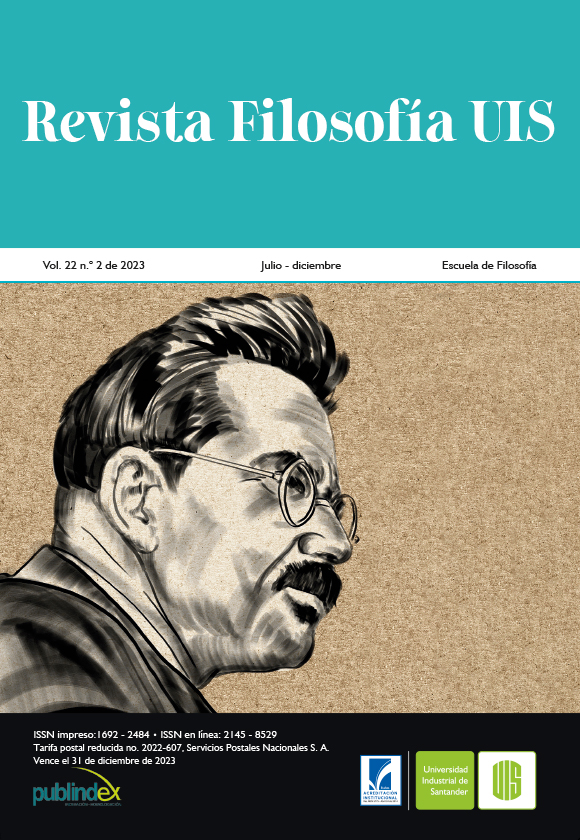From the analogy of other to infinite responsibility, between Edmund Husserl and Emanuel Levinas
Published 2023-07-25
Keywords
- subjectivity,
- immanence,
- transcendence,
- alterity,
- face
How to Cite
Copyright (c) 2023 Revista Filosofía UIS

This work is licensed under a Creative Commons Attribution 4.0 International License.
Abstract
This research is circumscribed within the thematic field of Edmund Husserl's transcendental phenomenology. And its objective is to try to elucidate within the same immanence of the transcendental experience of I think, the way not only in which intersubjectivity arises, but also how this last concept, like that of egology, is based on a notion of modern subjectivity that, on the one hand, appears within phenomenological architecture, as a constituent of meaning within Husserlian meditation, and on the other, it can appear as a notion that prevents the elaboration of a new concept of man that includes otherness within it, as Emmanuel Lévinas thinks, and with it, the possibility of speaking of a separate self that does not find in the other a mere analogy of its own, or an extension of its own immanence, but rather, the possibility of finding in that other that comes our way, the condition by which one can speak of time, of the world and of existence as a relationship with others and for others.
Downloads
References
- Bech, J. M. (2001). De Husserl a Heidegger, la transformación del pensamiento fenomenológico. Edicions de la Universität Autónoma de Barcelona.
- Duque, N. (2021). Reseña. La navaja de Ockham, una lectura lírica y filosófica. Revista Filosofía UIS, 20(1), 329-336. https://doi.org/10.18273/revfil.v20n1-2021015
- Heidegger, M. (1927). Ser y tiempo. Escuela de Filosofía Universidad ARCIS.
- Husserl, E. (1996). Meditaciones cartesianas. Fondo de Cultura Económica.
- Husserl, E. (2005). Ideas relativas a una fenomenología pura y una filosofía fenomenológica Vol. II. Investigaciones fenomenológicas sobre la constitución. Fondo de Cultura Económica.
- Husserl, E. (2006). Investigaciones lógicas I. Alianza Editorial.
- Lévinas, E. (2002). Totalidad e infinito, ensayo sobre la exterioridad. Ediciones Sígueme.
- Lévinas, E. (2006). Ética como filosofía primera. Aparte Rei Revista de Filosofía, 43, 1-21.
- López, A. F. (2015). Vida humana fenomenológica: cuatro estudios sobre Edmund Husserl. Editorial Bonaventuriana.
- López, A. F. (2019). En el principio existía el axioma de no contradicción (Hacia Guillermo de Ockham por la Literatura y la Filosofía). Editorial Verbum.
- López, A. F. (2023). La pobreza universal. Relatos y ensayos, una hibridación. Universidad El Bosque.
- Medina, J. (2010). ¿El mesías soy yo?: introducción al pensamiento de Emmanuel Lévinas. Editorial Jus.
- Merleau-Ponty, M. (1993). Fenomenología de la percepción. Editorial Planeta Agostini.
- Rizo-Patrón, R. (2010). Diferencia y otredad desde la fenomenología de Husserl. ARETE Revista de Filosofía, 22(1), 87-105.
- Walton, R. (2001). Fenomenología de la empatía. Philosophica, 24, 409-428.
- Walton, R. (2004). Horizonticidad y juicio. Anuario Filosófico, 37(1), 197-240.

